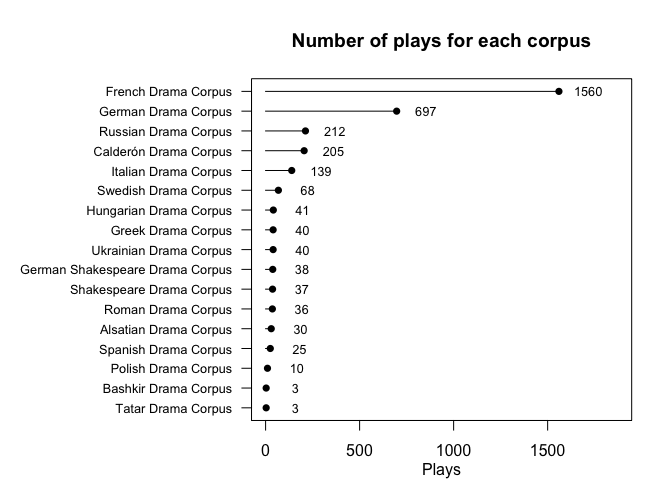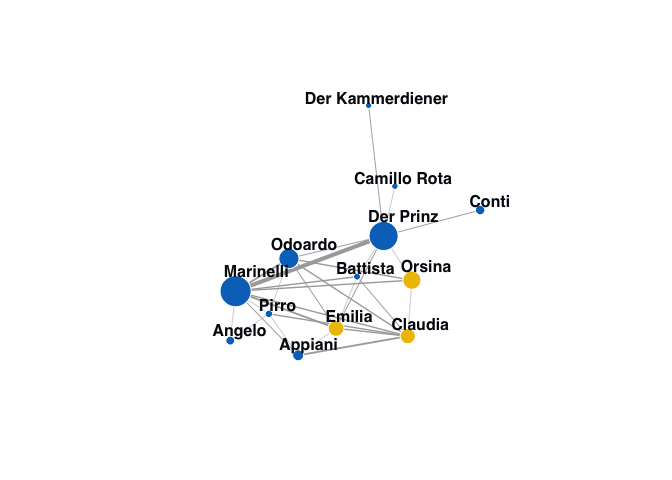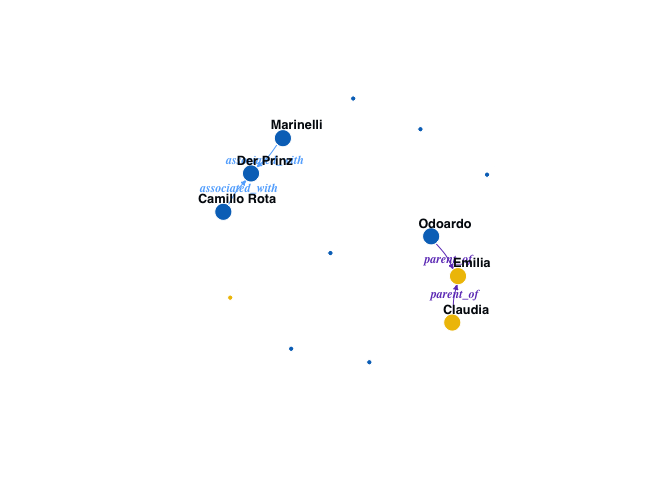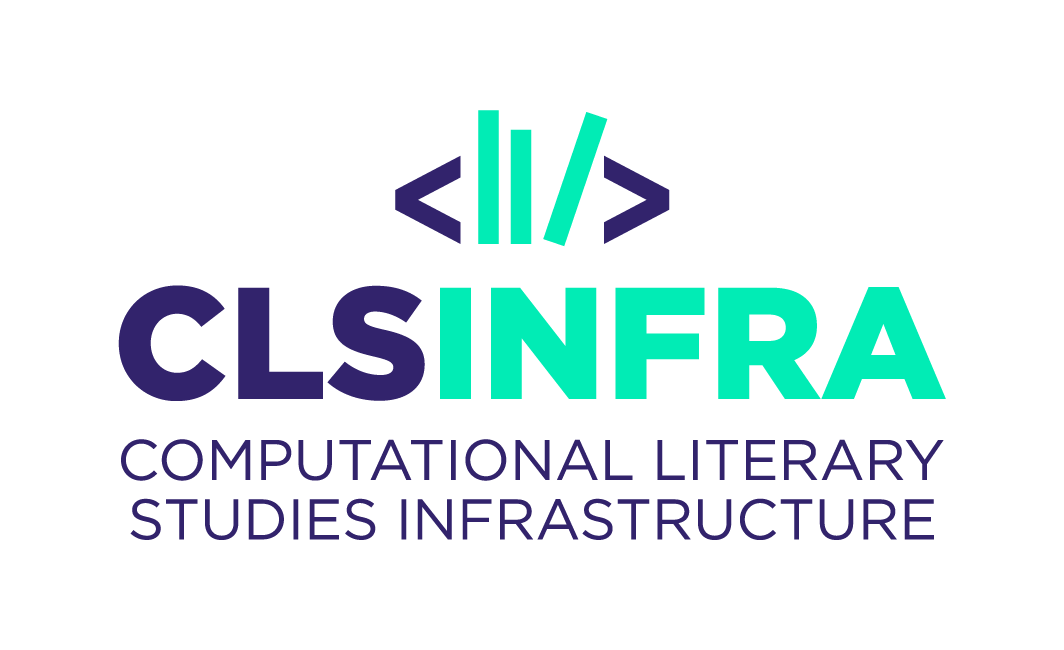

Authors: Ivan Pozdniakov, Frank Fischer
License: GPL-3
The goal of rdracor is to provide an R interface for the DraCor API (DraCor: Drama Corpora Project). Website of the project: dracor.org.
Installation from CRAN:
install.packages("rdracor")If you wish to install the current build of the next release you can do so using the following:
# install.packages("remotes")
remotes::install_github("dracor-org/rdracor")library(rdracor)DraCor API has several versions. By default, it utilizes the main branch:
get_dracor_api_url()
#> [1] "https://dracor.org/api/v1"You can set DraCor URL API of your choice:
set_dracor_api_url("https://staging.dracor.org/api/v1")Retrieving general information about available corpora:
corpora <- get_dracor_meta()
summary(corpora)
#> DraCor hosts 17 corpora comprising 3184 plays.
#>
#> The last updated corpus was German Drama Corpus (2024-04-03 10:50:28).
plot(corpora)
ger <- get_dracor(corpus = "ger")
summary(ger)
#> 697 plays in German Drama Corpus
#> Corpus id: ger, repository: https://github.com/dracor-org/gerdracor
#> Description: Edited by Frank Fischer and Peer Trilcke. Features more than 600 German-language plays from the 1540s to the 1940s. For a corpus description and full credits please see the [README on GitHub](https://github.com/dracor-org/gerdracor).
#> Written years (range): 1549–1947
#> Premiere years (range): 1515–1981
#> Years of the first printing (range): 1517–1962You can get all corpora at once:
all <- get_dracor()
summary(all)
#> 3184 plays in 17 corpora:
#> Corpora id:
#> fre (1560 plays), ger (697 plays), rus (212 plays), cal (205 plays), ita (139 plays), swe (68 plays), hun (41 plays), greek (40 plays), u (40 plays), gersh (38 plays), shake (37 plays), rom (36 plays), als (30 plays), span (25 plays), pol (10 plays), bash (3 plays), tat (3 plays)
#> Written years (range): 43–1970
#> Premiere years (range): -472–1999
#> Years of the first printing (range): 1170–2017With get_play_metadata() you can get miscellaneous data
for a play:
get_play_metadata(play = "lessing-emilia-galotti",
corpus = "ger",
full_metadata = FALSE) #use full_metadata = FALSE for faster download
#> $id
#> [1] "ger000088"
#>
#> $uri
#> [1] "https://dracor.org/api/v1/corpora/ger/plays/lessing-emilia-galotti"
#>
#> $name
#> [1] "lessing-emilia-galotti"
#>
#> $corpus
#> [1] "ger"
#>
#> $title
#> [1] "Emilia Galotti"
#>
#> $authors
#> # A tibble: 1 × 4
#> name fullname shortname refs
#> <chr> <chr> <chr> <list>
#> 1 Lessing, Gotthold Ephraim Gotthold Ephraim Lessing Lessing <df [2 × 2]>
#>
#> $normalizedGenre
#> [1] "Tragedy"
#>
#> $libretto
#> [1] FALSE
#>
#> $allInSegment
#> [1] 30
#>
#> $allInIndex
#> [1] 0.6976744
#>
#> $characters
#> # A tibble: 13 × 12
#> id name isGroup gender numOfScenes numOfSpeechActs numOfWords degree
#> <chr> <chr> <lgl> <chr> <int> <int> <int> <int>
#> 1 der_prinz Der … FALSE MALE 17 157 4002 8
#> 2 der_kamme… Der … FALSE MALE 2 6 33 1
#> 3 conti Conti FALSE MALE 2 24 604 1
#> 4 marinelli Mari… FALSE MALE 19 221 4343 9
#> 5 camillo_r… Cami… FALSE MALE 1 6 78 1
#> 6 claudia Clau… FALSE FEMALE 13 73 1581 7
#> 7 pirro Pirro FALSE MALE 4 25 263 5
#> 8 odoardo Odoa… FALSE MALE 12 108 2441 6
#> 9 angelo Ange… FALSE MALE 2 28 487 2
#> 10 emilia Emil… FALSE FEMALE 7 64 1702 6
#> 11 appiani Appi… FALSE MALE 5 48 852 4
#> 12 battista Batt… FALSE MALE 4 11 152 4
#> 13 orsina Orsi… FALSE FEMALE 6 64 2111 4
#> # ℹ 4 more variables: weightedDegree <int>, closeness <dbl>, betweenness <dbl>,
#> # eigenvector <dbl>
#>
#> $segments
#> # A tibble: 43 × 4
#> type number title speakers
#> <chr> <int> <chr> <list>
#> 1 scene 1 Erster Aufzug | Erster Auftritt <chr [2]>
#> 2 scene 2 Erster Aufzug | Zweiter Auftritt <chr [2]>
#> 3 scene 3 Erster Aufzug | Dritter Auftritt <chr [1]>
#> 4 scene 4 Erster Aufzug | Vierter Auftritt <chr [2]>
#> 5 scene 5 Erster Aufzug | Fünfter Auftritt <chr [1]>
#> 6 scene 6 Erster Aufzug | Sechster Auftritt <chr [2]>
#> 7 scene 7 Erster Aufzug | Siebenter Auftritt <chr [2]>
#> 8 scene 8 Erster Aufzug | Achter Auftritt <chr [2]>
#> 9 scene 9 Zweiter Aufzug | Erster Auftritt <chr [2]>
#> 10 scene 10 Zweiter Aufzug | Zweiter Auftritt <chr [2]>
#> # ℹ 33 more rows
#>
#> $yearWritten
#> NULL
#>
#> $yearPremiered
#> [1] "1772"
#>
#> $yearPrinted
#> [1] "1772"
#>
#> $yearNormalized
#> [1] 1772
#>
#> $wikidataId
#> [1] "Q782653"
#>
#> $subtitle
#> [1] "Ein Trauerspiel in fünf Aufzügen"
#>
#> $relations
#> # A tibble: 4 × 4
#> directed type source target
#> <lgl> <chr> <chr> <chr>
#> 1 TRUE parent_of odoardo emilia
#> 2 TRUE parent_of claudia emilia
#> 3 TRUE associated_with marinelli der_prinz
#> 4 TRUE associated_with camillo_rota der_prinz
#>
#> $source
#> $source$name
#> [1] "TextGrid Repository"
#>
#> $source$url
#> [1] "http://www.textgridrep.org/textgrid:rksp.0"
#>
#>
#> $datePremiered
#> [1] "1772-03-13"
#>
#> $originalSource
#> [1] "Gotthold Ephraim Lessing: Emilia Galotti. Ein Trauerspiel in fünf Aufzügen. In: Werke. Zweiter Band. Herausgegeben von Herbert G. Göpfert. München: Hanser 1971, S. 127–204."You can extract a co-occurence network (undirected weighted graph) for a specific play:
emilia <- get_net_cooccur_igraph(play = "lessing-emilia-galotti", corpus = "ger")
plot(emilia)
You can use the package {igraph} to work with this
object as a graph:
library(igraph)
edge_density(emilia)
#> [1] 0.3717949
cohesion(emilia)
#> [1] 1In addition, you can get a summary with network properties and gender distribution:
summary(emilia)
#> ger: lessing-emilia-galotti - co-ocurence network summary
#> Lessing, Gotthold Ephraim: Emilia Galotti (1772)
#>
#> Size: 13 (3 FEMALES, 10 MALES, 0 UNKNOWN)
#> Density: 0.37
#> Degree:
#> - Maximum: 9 (Marinelli)
#> Distance:
#> - Maximum (Diameter): 6
#> - Average: 3.03
#> Clustering:
#> - Global: 0.54
#> - Average local: 0.67
#> Cohesion: 1
#> Assortativity: -0.45Similarly, you can use function
get_net_relations_igraph() to build a network based on
relationships data:
galotti_relations <- get_net_relations_igraph(play = "lessing-emilia-galotti",
corpus = "ger")
plot(galotti_relations)
summary(galotti_relations)
#> ger: lessing-emilia-galotti - relations network summary
#> Lessing, Gotthold Ephraim: Emilia Galotti (1772)
#>
#> Size: 13 (3 FEMALES, 10 MALES, 0 UNKNOWN)
#> Relations: 4
#> Odoardo ---> Emilia : parent_of
#> Claudia ---> Emilia : parent_of
#> Marinelli ---> Der Prinz : associated_with
#> Camillo Rota ---> Der Prinz : associated_withYou can get text of a play in different forms:
{xml2}):get_text_tei(play = "lessing-emilia-galotti", corpus = "ger")
#> {xml_document}
#> <TEI id="ger000088" lang="ger" xmlns="http://www.tei-c.org/ns/1.0">
#> [1] <teiHeader>\n <fileDesc>\n <titleStmt>\n <title type="main">Emil ...
#> [2] <standOff>\n <listEvent>\n <event type="print" when="1772">\n <d ...
#> [3] <text>\n <front>\n <titlePage>\n <docAuthor>Gotthold Ephraim Les ...text_galotti <- get_text_chr_spoken(play = "lessing-emilia-galotti",
corpus = "ger")
head(text_galotti)
#> [1] "Klagen, nichts als Klagen! Bittschriften, nichts als Bittschriften! – Die traurigen Geschäfte; und man beneidet uns noch! – Das glaub' ich; wenn wir allen helfen könnten: dann wären wir zu beneiden. – Emilia? Eine Emilia? – Aber eine Emilia Bruneschi – nicht Galotti. Nicht Emilia Galotti! – Was will sie, diese Emilia Bruneschi? Viel gefodert; sehr viel. – Doch sie heißt Emilia. Gewährt! Es ist wohl noch keiner von den Räten in dem Vorzimmer?"
#> [2] "Nein."
#> [3] "Ich habe zu früh Tag gemacht. – Der Morgen ist so schön. Ich will ausfahren. Marchese Marinelli soll mich begleiten. Laßt ihn rufen. – Ich kann doch nicht mehr arbeiten. – Ich war so ruhig, bild' ich mir ein, so ruhig – Auf einmal muß eine arme Bruneschi, Emilia heißen; – weg ist meine Ruhe, und alles! –"
#> [4] "Nach dem Marchese ist geschickt. Und hier, ein Brief von der Gräfin Orsina."
#> [5] "Der Orsina? Legt ihn hin."
#> [6] "Ihr Läufer wartet."get_text_df(play = "lessing-emilia-galotti", corpus = "ger")
#> # A tibble: 1,174 × 10
#> text type type_attributes who scene scene_path subdiv_path line_id
#> <chr> <chr> <chr> <chr> <chr> <chr> <chr> <int>
#> 1 Die Szene, … stage "" <NA> Erst… act 1 stage 1 1
#> 2 an einem Ar… stage "" der_… Erst… act 1 | s… sp 1 | sta… 2
#> 3 Klagen, nic… p "" der_… Erst… act 1 | s… sp 1 | p 1 3
#> 4 Indem er no… stage "" der_… Erst… act 1 | s… sp 1 | p 1 4
#> 5 Eine Emilia… p "" der_… Erst… act 1 | s… sp 1 | p 1 5
#> 6 Er lieset. stage "" der_… Erst… act 1 | s… sp 1 | p 1 6
#> 7 Viel gefode… p "" der_… Erst… act 1 | s… sp 1 | p 1 7
#> 8 Er untersch… stage "" der_… Erst… act 1 | s… sp 1 | p 1 8
#> 9 Es ist wohl… p "" der_… Erst… act 1 | s… sp 1 | p 1 9
#> 10 Nein. p "" der_… Erst… act 1 | s… sp 2 | p 1 10
#> # ℹ 1,164 more rows
#> # ℹ 2 more variables: subdiv_id <int>, scene_id <int>If you want to use another version of DraCor API (e.g. staging or
locally saved on your computer), you can use function
set_dracor_api_url():
set_dracor_api_url("https://staging.dracor.org/api/v1")
#> Working DraCor repository was changed from https://dracor.org/api/v1
#> DraCor API URL: https://staging.dracor.org/api/v1
#> name: DraCor API v1
#> version: 1.0.2-28-ga8c07fe
#> status: stable
#> existdb: 6.2.0
#> base: https://staging.dracor.org/api/v1
#> openapi: https://staging.dracor.org/api/v1/openapi.yaml
get_dracor("u")
#> # A tibble: 44 × 60
#> corpus id playName yearNormalized title titleEn subtitle subtitleEn
#> * <chr> <chr> <chr> <int> <chr> <lgl> <chr> <lgl>
#> 1 u u000001 lesya-ukrai… 1911 Адво… NA <NA> NA
#> 2 u u0000010 lesya-ukrai… 1905 Три … NA <NA> NA
#> 3 u u0000011 lesya-ukrai… 1901 Одер… NA Драмати… NA
#> 4 u u0000012 lesya-ukrai… 1909 У пу… NA <NA> NA
#> 5 u u0000013 lesya-ukrai… 1896 Блак… NA <NA> NA
#> 6 u u0000014 lesya-ukrai… 1906 В до… NA <NA> NA
#> 7 u u0000015 lesya-ukrai… 1898 Іфіг… NA (драмат… NA
#> 8 u u0000016 kropivnitsk… 1863 Дай … NA Драма в… NA
#> 9 u u0000017 lesya-ukrai… 1896 Прощ… NA <NA> NA
#> 10 u u0000018 lesya-ukrai… 1903 У по… NA Драмати… NA
#> # ℹ 34 more rows
#> # ℹ 52 more variables: firstAuthorName <chr>, authors <list>,
#> # source.name <chr>, source.url <chr>, yearWrittenStart <lgl>,
#> # yearWrittenFinish <int>, yearPrintedStart <lgl>, yearPrintedFinish <int>,
#> # yearPremieredStart <lgl>, yearPremieredFinish <lgl>, wikidataId <lgl>,
#> # networkSize <int>, networkdataCsvUrl <chr>, normalizedGenre <lgl>,
#> # size <int>, density <dbl>, diameter <int>, averageClustering <dbl>, …Information on the working API can be retrieved by
dracor_api_info():
dracor_api_info()
#> DraCor API URL: https://staging.dracor.org/api/v1
#> name: DraCor API v1
#> version: 1.0.2-28-ga8c07fe
#> status: stable
#> existdb: 6.2.0
#> base: https://staging.dracor.org/api/v1
#> openapi: https://staging.dracor.org/api/v1/openapi.yamlThe development of this research software was supported by Computational Literary Studies Infrastructure (CLS INFRA) through its Transnational Access Fellowship programme. CLS INFRA has received funding from the European Union’s Horizon 2020 research and innovation programme under grant agreement №101004984.

